Deck 5: Inverse, Exponential, and Logarithmic Functions
Question
Question
Question
Question
Question
Question
Question
Question
Question
Question
Question
Question
Question
Question
Question
Question
Question
Question
Question
Question
Question
Question
Question
Question
Question
Question
Question
Question
Question
Question
Question
Question
Question
Question
Question
Question
Question
Question
Question
Question
Question
Question
Question
Question
Question
Question
Question
Question
Question
Question
Question
Question
Question
Question
Question
Question
Question
Question
Question
Question
Question
Question
Question
Question
Question
Question
Question
Question
Question
Question
Question
Question
Question
Question
Question
Question
Question
Question
Question
Question

Unlock Deck
Sign up to unlock the cards in this deck!
Unlock Deck
Unlock Deck
1/144
Play
Full screen (f)
Deck 5: Inverse, Exponential, and Logarithmic Functions
1
Determine the range of  for the function without actually finding
for the function without actually finding  . Hint: First find the domain and range of
. Hint: First find the domain and range of 

A)
B)
C)
D)
E)
 for the function without actually finding
for the function without actually finding  . Hint: First find the domain and range of
. Hint: First find the domain and range of 

A)

B)

C)

D)

E)


2
Express in terms of logarithms of x, y, or z. 
A)
B)
C)
D)
E)

A)

B)

C)

D)

E)


3
Graph f on the given interval. Estimate the largest interval [ a , b ] with a < 0 < b on which f is one-to-one. ![<strong>Graph f on the given interval. Estimate the largest interval [ a , b ] with a < 0 < b on which f is one-to-one. </strong> A) B) C) D) E)](https://d2lvgg3v3hfg70.cloudfront.net/TB8634/11eb7cb3_b015_f09d_acd2_8f76b321a381_TB8634_11.jpg)
A)![<strong>Graph f on the given interval. Estimate the largest interval [ a , b ] with a < 0 < b on which f is one-to-one. </strong> A) B) C) D) E)](https://d2lvgg3v3hfg70.cloudfront.net/TB8634/11eb7cb3_b015_f09e_acd2_d1ebd5d2a2a5_TB8634_11.jpg)
B)![<strong>Graph f on the given interval. Estimate the largest interval [ a , b ] with a < 0 < b on which f is one-to-one. </strong> A) B) C) D) E)](https://d2lvgg3v3hfg70.cloudfront.net/TB8634/11eb7cb3_b015_f09f_acd2_0f3babd44c5f_TB8634_11.jpg)
C)![<strong>Graph f on the given interval. Estimate the largest interval [ a , b ] with a < 0 < b on which f is one-to-one. </strong> A) B) C) D) E)](https://d2lvgg3v3hfg70.cloudfront.net/TB8634/11eb7cb3_b015_f0a0_acd2_e9e03a9ea0b1_TB8634_11.jpg)
D)![<strong>Graph f on the given interval. Estimate the largest interval [ a , b ] with a < 0 < b on which f is one-to-one. </strong> A) B) C) D) E)](https://d2lvgg3v3hfg70.cloudfront.net/TB8634/11eb7cb3_b015_f0a1_acd2_c7928b96c635_TB8634_11.jpg)
E)![<strong>Graph f on the given interval. Estimate the largest interval [ a , b ] with a < 0 < b on which f is one-to-one. </strong> A) B) C) D) E)](https://d2lvgg3v3hfg70.cloudfront.net/TB8634/11eb7cb3_b016_17b2_acd2_afe82179b4f4_TB8634_11.jpg)
![<strong>Graph f on the given interval. Estimate the largest interval [ a , b ] with a < 0 < b on which f is one-to-one. </strong> A) B) C) D) E)](https://d2lvgg3v3hfg70.cloudfront.net/TB8634/11eb7cb3_b015_f09d_acd2_8f76b321a381_TB8634_11.jpg)
A)
![<strong>Graph f on the given interval. Estimate the largest interval [ a , b ] with a < 0 < b on which f is one-to-one. </strong> A) B) C) D) E)](https://d2lvgg3v3hfg70.cloudfront.net/TB8634/11eb7cb3_b015_f09e_acd2_d1ebd5d2a2a5_TB8634_11.jpg)
B)
![<strong>Graph f on the given interval. Estimate the largest interval [ a , b ] with a < 0 < b on which f is one-to-one. </strong> A) B) C) D) E)](https://d2lvgg3v3hfg70.cloudfront.net/TB8634/11eb7cb3_b015_f09f_acd2_0f3babd44c5f_TB8634_11.jpg)
C)
![<strong>Graph f on the given interval. Estimate the largest interval [ a , b ] with a < 0 < b on which f is one-to-one. </strong> A) B) C) D) E)](https://d2lvgg3v3hfg70.cloudfront.net/TB8634/11eb7cb3_b015_f0a0_acd2_e9e03a9ea0b1_TB8634_11.jpg)
D)
![<strong>Graph f on the given interval. Estimate the largest interval [ a , b ] with a < 0 < b on which f is one-to-one. </strong> A) B) C) D) E)](https://d2lvgg3v3hfg70.cloudfront.net/TB8634/11eb7cb3_b015_f0a1_acd2_c7928b96c635_TB8634_11.jpg)
E)
![<strong>Graph f on the given interval. Estimate the largest interval [ a , b ] with a < 0 < b on which f is one-to-one. </strong> A) B) C) D) E)](https://d2lvgg3v3hfg70.cloudfront.net/TB8634/11eb7cb3_b016_17b2_acd2_afe82179b4f4_TB8634_11.jpg)

4
Solve the equation. 
A)18
B)7
C)1
D)9
E)8

A)18
B)7
C)1
D)9
E)8

Unlock Deck
Unlock for access to all 144 flashcards in this deck.
Unlock Deck
k this deck
5
When the volume control on a stereo system is increased, the voltage across a loudspeaker changes from V 1 to V 2 , and the decibel increase is given by  Find the decibel increase if the voltage changes from 1.7 volts to 4 volts.
Find the decibel increase if the voltage changes from 1.7 volts to 4 volts.
A)db = 17.1
B)db = 6.3
C)db = 11.2
D)db = 7.4
E)db = 9.7
 Find the decibel increase if the voltage changes from 1.7 volts to 4 volts.
Find the decibel increase if the voltage changes from 1.7 volts to 4 volts.A)db = 17.1
B)db = 6.3
C)db = 11.2
D)db = 7.4
E)db = 9.7

Unlock Deck
Unlock for access to all 144 flashcards in this deck.
Unlock Deck
k this deck
6
Simplify the expression. 
A)1
B)
C)
D)
E)

A)1
B)

C)

D)

E)


Unlock Deck
Unlock for access to all 144 flashcards in this deck.
Unlock Deck
k this deck
7
Solve the equation: 
A)
B)
C)
D)
E)

A)

B)

C)

D)

E)


Unlock Deck
Unlock for access to all 144 flashcards in this deck.
Unlock Deck
k this deck
8
Find an exponential function of the form f (x) = ba x that has the given y-intercept and passes through the point P: y-intercept = 125; P (3,1);
A)
B)
C)
D)
E)
A)

B)

C)

D)

E)


Unlock Deck
Unlock for access to all 144 flashcards in this deck.
Unlock Deck
k this deck
9
In fishery science, a cohort is the collection of fish that results from one annual reproduction. It is usually assumed that the number of fish N( t ) still alive after t years is given by an exponential function. For Pacific halibut,  , where N o is the initial size of the cohort. Approximate the percentage of the original number still alive after 9 years.
, where N o is the initial size of the cohort. Approximate the percentage of the original number still alive after 9 years.
A)5.5%
B)50.4%
C)33.1%
D)16.5%
E)18.0%
 , where N o is the initial size of the cohort. Approximate the percentage of the original number still alive after 9 years.
, where N o is the initial size of the cohort. Approximate the percentage of the original number still alive after 9 years.A)5.5%
B)50.4%
C)33.1%
D)16.5%
E)18.0%

Unlock Deck
Unlock for access to all 144 flashcards in this deck.
Unlock Deck
k this deck
10
Change to exponential form. 
A)
B)
C)
D)
E)

A)

B)

C)

D)

E)


Unlock Deck
Unlock for access to all 144 flashcards in this deck.
Unlock Deck
k this deck
11
Solve the equation: 
A)
B)
C)
D)
E)

A)

B)

C)

D)

E)


Unlock Deck
Unlock for access to all 144 flashcards in this deck.
Unlock Deck
k this deck
12
An urban density model is a formula that relates the population density D ( in thousands/ mi 2 ) to the distance x (in miles) from the center of the city. The formula  for the central density a and coefficient of decay b has been found to be appropriate for many large U.S. cities. For the city of Atlanta in 1970, a = 5.5 and b = 0.10. At approximately what distance was the population density 2,800 per square mile?
for the central density a and coefficient of decay b has been found to be appropriate for many large U.S. cities. For the city of Atlanta in 1970, a = 5.5 and b = 0.10. At approximately what distance was the population density 2,800 per square mile?
A)2.9 mi
B)6.8 mi
C)14.7 mi
D)9.1 mi
E)62.3 mi
 for the central density a and coefficient of decay b has been found to be appropriate for many large U.S. cities. For the city of Atlanta in 1970, a = 5.5 and b = 0.10. At approximately what distance was the population density 2,800 per square mile?
for the central density a and coefficient of decay b has been found to be appropriate for many large U.S. cities. For the city of Atlanta in 1970, a = 5.5 and b = 0.10. At approximately what distance was the population density 2,800 per square mile?A)2.9 mi
B)6.8 mi
C)14.7 mi
D)9.1 mi
E)62.3 mi

Unlock Deck
Unlock for access to all 144 flashcards in this deck.
Unlock Deck
k this deck
13
Sketch the graph of the function. 
A)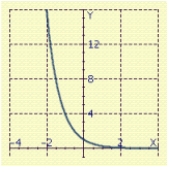
B)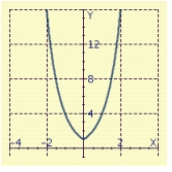
C)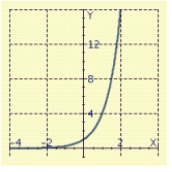
D)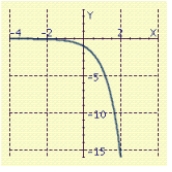

A)

B)

C)

D)


Unlock Deck
Unlock for access to all 144 flashcards in this deck.
Unlock Deck
k this deck
14
Solve the equation. 
A)
B)
C)
D)
E)

A)

B)

C)

D)

E)


Unlock Deck
Unlock for access to all 144 flashcards in this deck.
Unlock Deck
k this deck
15
If $900 is deposited in a savings account that pays interest at a rate of  % per year compounded continuously, find the balance after 7 years.
% per year compounded continuously, find the balance after 7 years.
A)$1,393.95
B)$1,369.77
C)$3,484.87
D)$581.08
E)$1,418.56
 % per year compounded continuously, find the balance after 7 years.
% per year compounded continuously, find the balance after 7 years.A)$1,393.95
B)$1,369.77
C)$3,484.87
D)$581.08
E)$1,418.56

Unlock Deck
Unlock for access to all 144 flashcards in this deck.
Unlock Deck
k this deck
16
If 7 grams of salt is added to a quantity of water, then the amount that is undissolved after t minutes is given by:  Sketch a graph that shows the value at any time from t = 0 to t = 10.
Sketch a graph that shows the value at any time from t = 0 to t = 10.
A)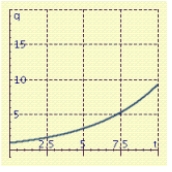
B)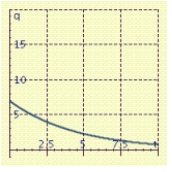
C)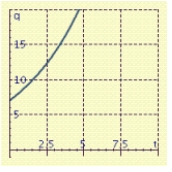
D)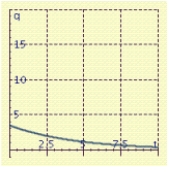
 Sketch a graph that shows the value at any time from t = 0 to t = 10.
Sketch a graph that shows the value at any time from t = 0 to t = 10.A)

B)

C)

D)


Unlock Deck
Unlock for access to all 144 flashcards in this deck.
Unlock Deck
k this deck
17
The Gompertz function,  is sometimes used to describe the sales of a new product whose sales are initially large but then level off toward a maximum saturation level. Graph the line and the Gompertz function with:
is sometimes used to describe the sales of a new product whose sales are initially large but then level off toward a maximum saturation level. Graph the line and the Gompertz function with: 
A)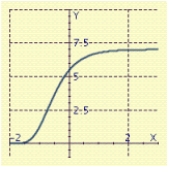
B)
C)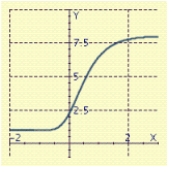
D)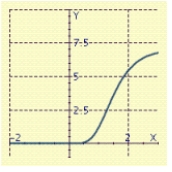
 is sometimes used to describe the sales of a new product whose sales are initially large but then level off toward a maximum saturation level. Graph the line and the Gompertz function with:
is sometimes used to describe the sales of a new product whose sales are initially large but then level off toward a maximum saturation level. Graph the line and the Gompertz function with: 
A)

B)

C)

D)


Unlock Deck
Unlock for access to all 144 flashcards in this deck.
Unlock Deck
k this deck
18
Ventilation is an effective way to improve indoor air quality. In nonsmoking restaurants, air circulation requirements (in  ) are given by the function
) are given by the function  , where x is the number of people in the dining area. Find
, where x is the number of people in the dining area. Find  . Use
. Use  to determine the maximum number of people that should be in a restaurant having a ventilation capability of 2,700
to determine the maximum number of people that should be in a restaurant having a ventilation capability of 2,700  .
. 
A)72
B)73
C)77
D)79
E)78
 ) are given by the function
) are given by the function  , where x is the number of people in the dining area. Find
, where x is the number of people in the dining area. Find  . Use
. Use  to determine the maximum number of people that should be in a restaurant having a ventilation capability of 2,700
to determine the maximum number of people that should be in a restaurant having a ventilation capability of 2,700  .
. 
A)72
B)73
C)77
D)79
E)78

Unlock Deck
Unlock for access to all 144 flashcards in this deck.
Unlock Deck
k this deck
19
If monthly payments p are deposited in a savings account paying an annual interest rate r, then the amount A in the account after n years is given by: 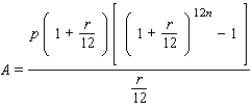 Estimate n for p = 90, r = 0.08 and A = $259,153.
Estimate n for p = 90, r = 0.08 and A = $259,153.
A)
B)
C)
D)
E)
 Estimate n for p = 90, r = 0.08 and A = $259,153.
Estimate n for p = 90, r = 0.08 and A = $259,153.A)

B)

C)

D)

E)


Unlock Deck
Unlock for access to all 144 flashcards in this deck.
Unlock Deck
k this deck
20
If the pollution of Lake Erie were stopped suddenly, it has been estimated that the level y of pollutants would decrease according to the formula y = y o e -0.3937t , where t is the time in years and y o is the pollutant level at which further pollution ceased. How many years would it take to clear 59% of the pollutants?
A)t = 0.98 years
B)t = 1.34 years
C)t = 2.02 years
D)t = 2.26 years
E)t = 0.58 years
A)t = 0.98 years
B)t = 1.34 years
C)t = 2.02 years
D)t = 2.26 years
E)t = 0.58 years

Unlock Deck
Unlock for access to all 144 flashcards in this deck.
Unlock Deck
k this deck
21
Solve the equation. 
A)8
B)1
C)16
D)4
E)9

A)8
B)1
C)16
D)4
E)9

Unlock Deck
Unlock for access to all 144 flashcards in this deck.
Unlock Deck
k this deck
22
The Gompertz function,  is sometimes used to describe the sales of a new product whose sales are initially large but then level off toward a maximum saturation level. Graph the line and the Gompertz function with:
is sometimes used to describe the sales of a new product whose sales are initially large but then level off toward a maximum saturation level. Graph the line and the Gompertz function with: 
A)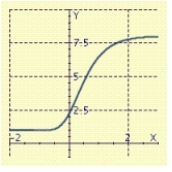
B)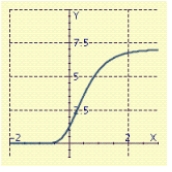
C)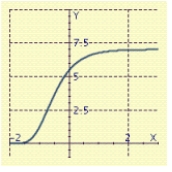
D)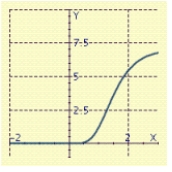
 is sometimes used to describe the sales of a new product whose sales are initially large but then level off toward a maximum saturation level. Graph the line and the Gompertz function with:
is sometimes used to describe the sales of a new product whose sales are initially large but then level off toward a maximum saturation level. Graph the line and the Gompertz function with: 
A)

B)

C)

D)


Unlock Deck
Unlock for access to all 144 flashcards in this deck.
Unlock Deck
k this deck
23
Graph f on the given interval. Estimate the largest interval [ a , b ] with a < 0 < b on which f is one-to-one. ![<strong>Graph f on the given interval. Estimate the largest interval [ a , b ] with a < 0 < b on which f is one-to-one. </strong> A) B) C) D) E)](https://d2lvgg3v3hfg70.cloudfront.net/TB8634/11eb7cb3_b019_2455_acd2_4b951947fa2e_TB8634_11.jpg)
A)![<strong>Graph f on the given interval. Estimate the largest interval [ a , b ] with a < 0 < b on which f is one-to-one. </strong> A) B) C) D) E)](https://d2lvgg3v3hfg70.cloudfront.net/TB8634/11eb7cb3_b019_4b66_acd2_f53c0b6add61_TB8634_11.jpg)
B)![<strong>Graph f on the given interval. Estimate the largest interval [ a , b ] with a < 0 < b on which f is one-to-one. </strong> A) B) C) D) E)](https://d2lvgg3v3hfg70.cloudfront.net/TB8634/11eb7cb3_b019_4b67_acd2_a1fb6b2cd5b6_TB8634_11.jpg)
C)![<strong>Graph f on the given interval. Estimate the largest interval [ a , b ] with a < 0 < b on which f is one-to-one. </strong> A) B) C) D) E)](https://d2lvgg3v3hfg70.cloudfront.net/TB8634/11eb7cb3_b019_4b68_acd2_d5a787d32f64_TB8634_11.jpg)
D)![<strong>Graph f on the given interval. Estimate the largest interval [ a , b ] with a < 0 < b on which f is one-to-one. </strong> A) B) C) D) E)](https://d2lvgg3v3hfg70.cloudfront.net/TB8634/11eb7cb3_b019_4b69_acd2_87a4b6083611_TB8634_11.jpg)
E)![<strong>Graph f on the given interval. Estimate the largest interval [ a , b ] with a < 0 < b on which f is one-to-one. </strong> A) B) C) D) E)](https://d2lvgg3v3hfg70.cloudfront.net/TB8634/11eb7cb3_b019_4b6a_acd2_ed929abafee5_TB8634_11.jpg)
![<strong>Graph f on the given interval. Estimate the largest interval [ a , b ] with a < 0 < b on which f is one-to-one. </strong> A) B) C) D) E)](https://d2lvgg3v3hfg70.cloudfront.net/TB8634/11eb7cb3_b019_2455_acd2_4b951947fa2e_TB8634_11.jpg)
A)
![<strong>Graph f on the given interval. Estimate the largest interval [ a , b ] with a < 0 < b on which f is one-to-one. </strong> A) B) C) D) E)](https://d2lvgg3v3hfg70.cloudfront.net/TB8634/11eb7cb3_b019_4b66_acd2_f53c0b6add61_TB8634_11.jpg)
B)
![<strong>Graph f on the given interval. Estimate the largest interval [ a , b ] with a < 0 < b on which f is one-to-one. </strong> A) B) C) D) E)](https://d2lvgg3v3hfg70.cloudfront.net/TB8634/11eb7cb3_b019_4b67_acd2_a1fb6b2cd5b6_TB8634_11.jpg)
C)
![<strong>Graph f on the given interval. Estimate the largest interval [ a , b ] with a < 0 < b on which f is one-to-one. </strong> A) B) C) D) E)](https://d2lvgg3v3hfg70.cloudfront.net/TB8634/11eb7cb3_b019_4b68_acd2_d5a787d32f64_TB8634_11.jpg)
D)
![<strong>Graph f on the given interval. Estimate the largest interval [ a , b ] with a < 0 < b on which f is one-to-one. </strong> A) B) C) D) E)](https://d2lvgg3v3hfg70.cloudfront.net/TB8634/11eb7cb3_b019_4b69_acd2_87a4b6083611_TB8634_11.jpg)
E)
![<strong>Graph f on the given interval. Estimate the largest interval [ a , b ] with a < 0 < b on which f is one-to-one. </strong> A) B) C) D) E)](https://d2lvgg3v3hfg70.cloudfront.net/TB8634/11eb7cb3_b019_4b6a_acd2_ed929abafee5_TB8634_11.jpg)

Unlock Deck
Unlock for access to all 144 flashcards in this deck.
Unlock Deck
k this deck
24
Simplify the expression. 
A)1
B)
C)
D)
E)

A)1
B)

C)

D)

E)


Unlock Deck
Unlock for access to all 144 flashcards in this deck.
Unlock Deck
k this deck
25
Sketch the graph of the function. 
A)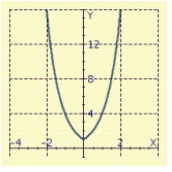
B)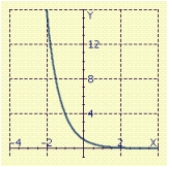
C)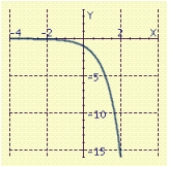
D)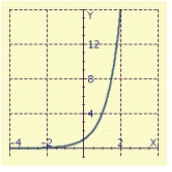

A)

B)

C)

D)


Unlock Deck
Unlock for access to all 144 flashcards in this deck.
Unlock Deck
k this deck
26
If 3 grams of salt is added to a quantity of water, then the amount that is undissolved after t minutes is given by:  Sketch a graph that shows the value at any time from t = 0 to t = 10.
Sketch a graph that shows the value at any time from t = 0 to t = 10.
A)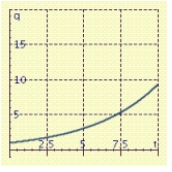
B)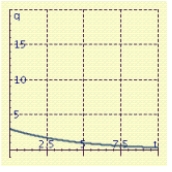
C)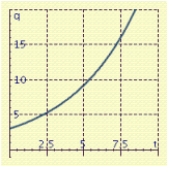
D)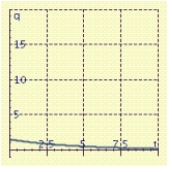
 Sketch a graph that shows the value at any time from t = 0 to t = 10.
Sketch a graph that shows the value at any time from t = 0 to t = 10.A)

B)

C)

D)


Unlock Deck
Unlock for access to all 144 flashcards in this deck.
Unlock Deck
k this deck
27
Use the change of base formula to approximate the x-intercept. 
A)2.3219
B)0.0602
C)0.9027
D)0.4307
E)5.1603

A)2.3219
B)0.0602
C)0.9027
D)0.4307
E)5.1603

Unlock Deck
Unlock for access to all 144 flashcards in this deck.
Unlock Deck
k this deck
28
Determine the range of  for the function without actually finding
for the function without actually finding  . Hint: First find the domain and range of
. Hint: First find the domain and range of 

A)
B)
C)
D)
E)
 for the function without actually finding
for the function without actually finding  . Hint: First find the domain and range of
. Hint: First find the domain and range of 

A)

B)

C)

D)

E)


Unlock Deck
Unlock for access to all 144 flashcards in this deck.
Unlock Deck
k this deck
29
Solve the equation: 
A)
B)
C)
D)
E)

A)

B)

C)

D)

E)


Unlock Deck
Unlock for access to all 144 flashcards in this deck.
Unlock Deck
k this deck
30
If monthly payments p are deposited in a savings account paying an annual interest rate r, then the amount A in the account after n years is given by: 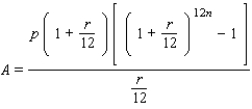 Estimate n for p = 98, r = 0.02 and A = $208,744.
Estimate n for p = 98, r = 0.02 and A = $208,744.
A)
B)
C)
D)
E)
 Estimate n for p = 98, r = 0.02 and A = $208,744.
Estimate n for p = 98, r = 0.02 and A = $208,744.A)

B)

C)

D)

E)


Unlock Deck
Unlock for access to all 144 flashcards in this deck.
Unlock Deck
k this deck
31
If $1,200 is deposited in a savings account that pays interest at a rate of  % per year compounded continuously, find the balance after 4 years.
% per year compounded continuously, find the balance after 4 years.
A)$1,826.35
B)$1,808.18
C)$4,520.45
D)$1,790.19
E)$796.38
 % per year compounded continuously, find the balance after 4 years.
% per year compounded continuously, find the balance after 4 years.A)$1,826.35
B)$1,808.18
C)$4,520.45
D)$1,790.19
E)$796.38

Unlock Deck
Unlock for access to all 144 flashcards in this deck.
Unlock Deck
k this deck
32
An urban density model is a formula that relates the population density D ( in thousands/ mi 2 ) to the distance x (in miles) from the center of the city. The formula  for the central density a and coefficient of decay b has been found to be appropriate for many large U.S. cities. For the city of Atlanta in 1970, a = 5.5 and b = 0.10. At approximately what distance was the population density 1,800 per square mile?
for the central density a and coefficient of decay b has been found to be appropriate for many large U.S. cities. For the city of Atlanta in 1970, a = 5.5 and b = 0.10. At approximately what distance was the population density 1,800 per square mile?
A)13.5 mi
B)11.2 mi
C)57.9 mi
D)4.9 mi
E)23.5 mi
 for the central density a and coefficient of decay b has been found to be appropriate for many large U.S. cities. For the city of Atlanta in 1970, a = 5.5 and b = 0.10. At approximately what distance was the population density 1,800 per square mile?
for the central density a and coefficient of decay b has been found to be appropriate for many large U.S. cities. For the city of Atlanta in 1970, a = 5.5 and b = 0.10. At approximately what distance was the population density 1,800 per square mile?A)13.5 mi
B)11.2 mi
C)57.9 mi
D)4.9 mi
E)23.5 mi

Unlock Deck
Unlock for access to all 144 flashcards in this deck.
Unlock Deck
k this deck
33
In fishery science, a cohort is the collection of fish that results from one annual reproduction. It is usually assumed that the number of fish N( t ) still alive after t years is given by an exponential function. For Pacific halibut,  , where N o is the initial size of the cohort. Approximate the percentage of the original number still alive after 14 years.
, where N o is the initial size of the cohort. Approximate the percentage of the original number still alive after 14 years.
A)6.1%
B)28.0%
C)2.0%
D)12.2%
E)81.8%
 , where N o is the initial size of the cohort. Approximate the percentage of the original number still alive after 14 years.
, where N o is the initial size of the cohort. Approximate the percentage of the original number still alive after 14 years.A)6.1%
B)28.0%
C)2.0%
D)12.2%
E)81.8%

Unlock Deck
Unlock for access to all 144 flashcards in this deck.
Unlock Deck
k this deck
34
Ventilation is an effective way to improve indoor air quality. In nonsmoking restaurants, air circulation requirements (in  ) are given by the function
) are given by the function  , where x is the number of people in the dining area. Find
, where x is the number of people in the dining area. Find  . Use
. Use  to determine the maximum number of people that should be in a restaurant having a ventilation capability of 2,550
to determine the maximum number of people that should be in a restaurant having a ventilation capability of 2,550  .
. 
A)81
B)75
C)82
D)80
E)76
 ) are given by the function
) are given by the function  , where x is the number of people in the dining area. Find
, where x is the number of people in the dining area. Find  . Use
. Use  to determine the maximum number of people that should be in a restaurant having a ventilation capability of 2,550
to determine the maximum number of people that should be in a restaurant having a ventilation capability of 2,550  .
. 
A)81
B)75
C)82
D)80
E)76

Unlock Deck
Unlock for access to all 144 flashcards in this deck.
Unlock Deck
k this deck
35
Find the exact solution, using common logarithms, and an approximation of the solution of the equation to two decimal places. 
A)
B)
C)
D)
E)

A)

B)

C)

D)

E)


Unlock Deck
Unlock for access to all 144 flashcards in this deck.
Unlock Deck
k this deck
36
One method of estimating the thickness of the ozone layer is to use the formula  , where I o is the intensity of a particular wavelength of light from the sun before it reaches the atmosphere, I is the intensity of the same wavelength after passing through a layer of ozone x centimeters thick, and k is the absorption constant of ozone for that wavelength. Suppose a wavelength of
, where I o is the intensity of a particular wavelength of light from the sun before it reaches the atmosphere, I is the intensity of the same wavelength after passing through a layer of ozone x centimeters thick, and k is the absorption constant of ozone for that wavelength. Suppose a wavelength of  cm with k = 0.43 ,
cm with k = 0.43 ,  is measured as 1.17. Approximate the thickness of the ozone layer to the nearest 0.01 centimeter.
is measured as 1.17. Approximate the thickness of the ozone layer to the nearest 0.01 centimeter.
A)x = 2.72 cm
B)x = 3.09 cm
C)x = 0.24 cm
D)x = 0.37 cm
E)x = 0.07 cm
 , where I o is the intensity of a particular wavelength of light from the sun before it reaches the atmosphere, I is the intensity of the same wavelength after passing through a layer of ozone x centimeters thick, and k is the absorption constant of ozone for that wavelength. Suppose a wavelength of
, where I o is the intensity of a particular wavelength of light from the sun before it reaches the atmosphere, I is the intensity of the same wavelength after passing through a layer of ozone x centimeters thick, and k is the absorption constant of ozone for that wavelength. Suppose a wavelength of  cm with k = 0.43 ,
cm with k = 0.43 ,  is measured as 1.17. Approximate the thickness of the ozone layer to the nearest 0.01 centimeter.
is measured as 1.17. Approximate the thickness of the ozone layer to the nearest 0.01 centimeter.A)x = 2.72 cm
B)x = 3.09 cm
C)x = 0.24 cm
D)x = 0.37 cm
E)x = 0.07 cm

Unlock Deck
Unlock for access to all 144 flashcards in this deck.
Unlock Deck
k this deck
37
Change to exponential form. 
A)
B)
C)
D)
E)

A)

B)

C)

D)

E)


Unlock Deck
Unlock for access to all 144 flashcards in this deck.
Unlock Deck
k this deck
38
Find an exponential function of the form f (x) = ba x that has the given y-intercept and passes through the point P: y-intercept = 64; P (3,1);
A)
B)
C)
D)
E)
A)

B)

C)

D)

E)


Unlock Deck
Unlock for access to all 144 flashcards in this deck.
Unlock Deck
k this deck
39
Use common logarithms to solve for x in terms of y. 
A)
B)
C)
D)
E)

A)

B)

C)

D)

E)


Unlock Deck
Unlock for access to all 144 flashcards in this deck.
Unlock Deck
k this deck
40
Solve the equation: 
A)
B)
C)
D)
E)

A)

B)

C)

D)

E)


Unlock Deck
Unlock for access to all 144 flashcards in this deck.
Unlock Deck
k this deck
41
If $900 is deposited in a savings account that pays interest at a rate of  % per year compounded continuously, find the balance after 7 years.
% per year compounded continuously, find the balance after 7 years.
A)$1,418.56
B)$581.08
C)$1,369.77
D)$1,393.95
E)$3,484.87
 % per year compounded continuously, find the balance after 7 years.
% per year compounded continuously, find the balance after 7 years.A)$1,418.56
B)$581.08
C)$1,369.77
D)$1,393.95
E)$3,484.87

Unlock Deck
Unlock for access to all 144 flashcards in this deck.
Unlock Deck
k this deck
42
When the volume control on a stereo system is increased, the voltage across a loudspeaker changes from V 1 to V 2 , and the decibel increase is given by  Find the decibel increase if the voltage changes from 2.2 volts to 3.5 volts.
Find the decibel increase if the voltage changes from 2.2 volts to 3.5 volts.
A)db = 9.3
B)db = 2.9
C)db = 6.3
D)db = 7.8
E)db = 4.0
 Find the decibel increase if the voltage changes from 2.2 volts to 3.5 volts.
Find the decibel increase if the voltage changes from 2.2 volts to 3.5 volts.A)db = 9.3
B)db = 2.9
C)db = 6.3
D)db = 7.8
E)db = 4.0

Unlock Deck
Unlock for access to all 144 flashcards in this deck.
Unlock Deck
k this deck
43
Ventilation is an effective way to improve indoor air quality. In nonsmoking restaurants, air circulation requirements (in  ) are given by the function
) are given by the function  , where x is the number of people in the dining area. Find
, where x is the number of people in the dining area. Find  . Use
. Use  to determine the maximum number of people that should be in a restaurant having a ventilation capability of 2,350
to determine the maximum number of people that should be in a restaurant having a ventilation capability of 2,350  .
. 
A)55
B)56
C)62
D)68
E)61
 ) are given by the function
) are given by the function  , where x is the number of people in the dining area. Find
, where x is the number of people in the dining area. Find  . Use
. Use  to determine the maximum number of people that should be in a restaurant having a ventilation capability of 2,350
to determine the maximum number of people that should be in a restaurant having a ventilation capability of 2,350  .
. 
A)55
B)56
C)62
D)68
E)61

Unlock Deck
Unlock for access to all 144 flashcards in this deck.
Unlock Deck
k this deck
44
If 7 grams of salt is added to a quantity of water, then the amount that is undissolved after t minutes is given by:  Sketch a graph that shows the value at any time from t = 0 to t = 10.
Sketch a graph that shows the value at any time from t = 0 to t = 10.
A)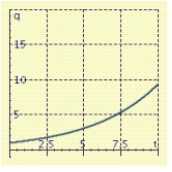
B)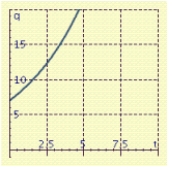
C)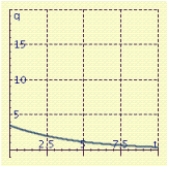
D)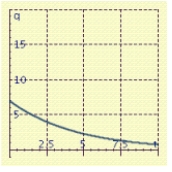
 Sketch a graph that shows the value at any time from t = 0 to t = 10.
Sketch a graph that shows the value at any time from t = 0 to t = 10.A)

B)

C)

D)


Unlock Deck
Unlock for access to all 144 flashcards in this deck.
Unlock Deck
k this deck
45
Express in terms of logarithms of x, y, or z. 
A)
B)
C)
D)
E)

A)

B)

C)

D)

E)


Unlock Deck
Unlock for access to all 144 flashcards in this deck.
Unlock Deck
k this deck
46
One method of estimating the thickness of the ozone layer is to use the formula  , where I o is the intensity of a particular wavelength of light from the sun before it reaches the atmosphere, I is the intensity of the same wavelength after passing through a layer of ozone x centimeters thick, and k is the absorption constant of ozone for that wavelength. Suppose a wavelength of
, where I o is the intensity of a particular wavelength of light from the sun before it reaches the atmosphere, I is the intensity of the same wavelength after passing through a layer of ozone x centimeters thick, and k is the absorption constant of ozone for that wavelength. Suppose a wavelength of  cm with k = 0.45 ,
cm with k = 0.45 ,  is measured as 1.14. Approximate the thickness of the ozone layer to the nearest 0.01 centimeter.
is measured as 1.14. Approximate the thickness of the ozone layer to the nearest 0.01 centimeter.
A)x = 0.06 cm
B)x = 2.82 cm
C)x = 0.16 cm
D)x = 2.53 cm
E)x = 0.29 cm
 , where I o is the intensity of a particular wavelength of light from the sun before it reaches the atmosphere, I is the intensity of the same wavelength after passing through a layer of ozone x centimeters thick, and k is the absorption constant of ozone for that wavelength. Suppose a wavelength of
, where I o is the intensity of a particular wavelength of light from the sun before it reaches the atmosphere, I is the intensity of the same wavelength after passing through a layer of ozone x centimeters thick, and k is the absorption constant of ozone for that wavelength. Suppose a wavelength of  cm with k = 0.45 ,
cm with k = 0.45 ,  is measured as 1.14. Approximate the thickness of the ozone layer to the nearest 0.01 centimeter.
is measured as 1.14. Approximate the thickness of the ozone layer to the nearest 0.01 centimeter.A)x = 0.06 cm
B)x = 2.82 cm
C)x = 0.16 cm
D)x = 2.53 cm
E)x = 0.29 cm

Unlock Deck
Unlock for access to all 144 flashcards in this deck.
Unlock Deck
k this deck
47
Sketch the graph of the function. 
A)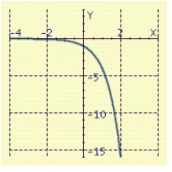
B)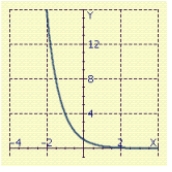
C)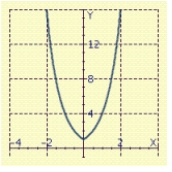
D)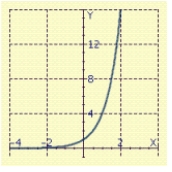

A)

B)

C)

D)


Unlock Deck
Unlock for access to all 144 flashcards in this deck.
Unlock Deck
k this deck
48
Graph f on the given interval. Estimate the largest interval [ a , b ] with a < 0 < b on which f is one-to-one. ![<strong>Graph f on the given interval. Estimate the largest interval [ a , b ] with a < 0 < b on which f is one-to-one. </strong> A) B) C) D) E)](https://d2lvgg3v3hfg70.cloudfront.net/TB8634/11eb7cb3_b01c_801d_acd2_0d530d9054a3_TB8634_11.jpg)
A)![<strong>Graph f on the given interval. Estimate the largest interval [ a , b ] with a < 0 < b on which f is one-to-one. </strong> A) B) C) D) E)](https://d2lvgg3v3hfg70.cloudfront.net/TB8634/11eb7cb3_b01c_801e_acd2_7330844deb9f_TB8634_11.jpg)
B)![<strong>Graph f on the given interval. Estimate the largest interval [ a , b ] with a < 0 < b on which f is one-to-one. </strong> A) B) C) D) E)](https://d2lvgg3v3hfg70.cloudfront.net/TB8634/11eb7cb3_b01c_801f_acd2_b1c2d2882bbc_TB8634_11.jpg)
C)![<strong>Graph f on the given interval. Estimate the largest interval [ a , b ] with a < 0 < b on which f is one-to-one. </strong> A) B) C) D) E)](https://d2lvgg3v3hfg70.cloudfront.net/TB8634/11eb7cb3_b01c_8020_acd2_4d14028d70c4_TB8634_11.jpg)
D)![<strong>Graph f on the given interval. Estimate the largest interval [ a , b ] with a < 0 < b on which f is one-to-one. </strong> A) B) C) D) E)](https://d2lvgg3v3hfg70.cloudfront.net/TB8634/11eb7cb3_b01c_a731_acd2_3b2546da297b_TB8634_11.jpg)
E)![<strong>Graph f on the given interval. Estimate the largest interval [ a , b ] with a < 0 < b on which f is one-to-one. </strong> A) B) C) D) E)](https://d2lvgg3v3hfg70.cloudfront.net/TB8634/11eb7cb3_b01c_a732_acd2_9fd1e675cef1_TB8634_11.jpg)
![<strong>Graph f on the given interval. Estimate the largest interval [ a , b ] with a < 0 < b on which f is one-to-one. </strong> A) B) C) D) E)](https://d2lvgg3v3hfg70.cloudfront.net/TB8634/11eb7cb3_b01c_801d_acd2_0d530d9054a3_TB8634_11.jpg)
A)
![<strong>Graph f on the given interval. Estimate the largest interval [ a , b ] with a < 0 < b on which f is one-to-one. </strong> A) B) C) D) E)](https://d2lvgg3v3hfg70.cloudfront.net/TB8634/11eb7cb3_b01c_801e_acd2_7330844deb9f_TB8634_11.jpg)
B)
![<strong>Graph f on the given interval. Estimate the largest interval [ a , b ] with a < 0 < b on which f is one-to-one. </strong> A) B) C) D) E)](https://d2lvgg3v3hfg70.cloudfront.net/TB8634/11eb7cb3_b01c_801f_acd2_b1c2d2882bbc_TB8634_11.jpg)
C)
![<strong>Graph f on the given interval. Estimate the largest interval [ a , b ] with a < 0 < b on which f is one-to-one. </strong> A) B) C) D) E)](https://d2lvgg3v3hfg70.cloudfront.net/TB8634/11eb7cb3_b01c_8020_acd2_4d14028d70c4_TB8634_11.jpg)
D)
![<strong>Graph f on the given interval. Estimate the largest interval [ a , b ] with a < 0 < b on which f is one-to-one. </strong> A) B) C) D) E)](https://d2lvgg3v3hfg70.cloudfront.net/TB8634/11eb7cb3_b01c_a731_acd2_3b2546da297b_TB8634_11.jpg)
E)
![<strong>Graph f on the given interval. Estimate the largest interval [ a , b ] with a < 0 < b on which f is one-to-one. </strong> A) B) C) D) E)](https://d2lvgg3v3hfg70.cloudfront.net/TB8634/11eb7cb3_b01c_a732_acd2_9fd1e675cef1_TB8634_11.jpg)

Unlock Deck
Unlock for access to all 144 flashcards in this deck.
Unlock Deck
k this deck
49
Simplify the expression. 
A)
B)1
C)
D)
E)

A)

B)1
C)

D)

E)


Unlock Deck
Unlock for access to all 144 flashcards in this deck.
Unlock Deck
k this deck
50
The Gompertz function,  is sometimes used to describe the sales of a new product whose sales are initially large but then level off toward a maximum saturation level. Graph the line and the Gompertz function with:
is sometimes used to describe the sales of a new product whose sales are initially large but then level off toward a maximum saturation level. Graph the line and the Gompertz function with: 
A)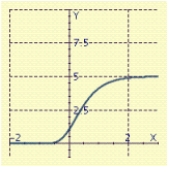
B)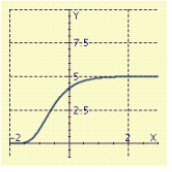
C)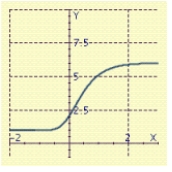
D)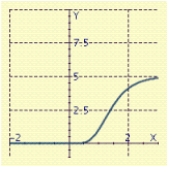
 is sometimes used to describe the sales of a new product whose sales are initially large but then level off toward a maximum saturation level. Graph the line and the Gompertz function with:
is sometimes used to describe the sales of a new product whose sales are initially large but then level off toward a maximum saturation level. Graph the line and the Gompertz function with: 
A)

B)

C)

D)


Unlock Deck
Unlock for access to all 144 flashcards in this deck.
Unlock Deck
k this deck
51
Find the exact solution, using common logarithms, and an approximation of the solution of the equation to two decimal places. 
A)
B)
C)
D)
E)

A)

B)

C)

D)

E)


Unlock Deck
Unlock for access to all 144 flashcards in this deck.
Unlock Deck
k this deck
52
Find an exponential function of the form f (x) = ba x that has the given y-intercept and passes through the point P: y-intercept = 125; P (3,1);
A)
B)
C)
D)
E)
A)

B)

C)

D)

E)


Unlock Deck
Unlock for access to all 144 flashcards in this deck.
Unlock Deck
k this deck
53
Determine the range of  for the function without actually finding
for the function without actually finding  . Hint: First find the domain and range of
. Hint: First find the domain and range of 

A)
B)
C)
D)
E)
 for the function without actually finding
for the function without actually finding  . Hint: First find the domain and range of
. Hint: First find the domain and range of 

A)

B)

C)

D)

E)


Unlock Deck
Unlock for access to all 144 flashcards in this deck.
Unlock Deck
k this deck
54
Use common logarithms to solve for x in terms of y. 
A)
B)
C)
D)
E)

A)

B)

C)

D)

E)


Unlock Deck
Unlock for access to all 144 flashcards in this deck.
Unlock Deck
k this deck
55
Use the change of base formula to approximate the x-intercept. 
A)2.8074
B)0.0430
C)1.6775
D)5.0672
E)0.3562

A)2.8074
B)0.0430
C)1.6775
D)5.0672
E)0.3562

Unlock Deck
Unlock for access to all 144 flashcards in this deck.
Unlock Deck
k this deck
56
If the pollution of Lake Erie were stopped suddenly, it has been estimated that the level y of pollutants would decrease according to the formula y = y o e -0.3937t , where t is the time in years and y o is the pollutant level at which further pollution ceased. How many years would it take to clear 59% of the pollutants?
A)t = 0.58 years
B)t = 1.34 years
C)t = 2.02 years
D)t = 0.98 years
E)t = 2.26 years
A)t = 0.58 years
B)t = 1.34 years
C)t = 2.02 years
D)t = 0.98 years
E)t = 2.26 years

Unlock Deck
Unlock for access to all 144 flashcards in this deck.
Unlock Deck
k this deck
57
Solve the equation: 
A)
B)
C)
D)
E)

A)

B)

C)

D)

E)


Unlock Deck
Unlock for access to all 144 flashcards in this deck.
Unlock Deck
k this deck
58
If monthly payments p are deposited in a savings account paying an annual interest rate r, then the amount A in the account after n years is given by: 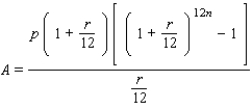 Estimate n for p = 96, r = 0.04 and A = $177,664.
Estimate n for p = 96, r = 0.04 and A = $177,664.
A)
B)
C)
D)
E)
 Estimate n for p = 96, r = 0.04 and A = $177,664.
Estimate n for p = 96, r = 0.04 and A = $177,664.A)

B)

C)

D)

E)


Unlock Deck
Unlock for access to all 144 flashcards in this deck.
Unlock Deck
k this deck
59
Solve the equation. 
A)
B)
C)
D)
E)

A)

B)

C)

D)

E)


Unlock Deck
Unlock for access to all 144 flashcards in this deck.
Unlock Deck
k this deck
60
Solve the equation: 
A)
B)
C)
D)
E)

A)

B)

C)

D)

E)


Unlock Deck
Unlock for access to all 144 flashcards in this deck.
Unlock Deck
k this deck
61
Express in terms of logarithms of x, y, or z. 
A)
B)
C)
D)
E)

A)

B)

C)

D)

E)


Unlock Deck
Unlock for access to all 144 flashcards in this deck.
Unlock Deck
k this deck
62
Solve the equation. 
A)1
B)7
C)2
D)5
E)4

A)1
B)7
C)2
D)5
E)4

Unlock Deck
Unlock for access to all 144 flashcards in this deck.
Unlock Deck
k this deck
63
Solve the equation: 
A)
B)
C)
D)
E)

A)

B)

C)

D)

E)


Unlock Deck
Unlock for access to all 144 flashcards in this deck.
Unlock Deck
k this deck
64
Use the change of base formula to approximate the x-intercept. 
A)2.8074
B)0.3562
C)1.1363
D)6.1496
E)0.0430

A)2.8074
B)0.3562
C)1.1363
D)6.1496
E)0.0430

Unlock Deck
Unlock for access to all 144 flashcards in this deck.
Unlock Deck
k this deck
65
The graph of a one-to-one function f is shown. Use the reflection property to sketch the graph of 
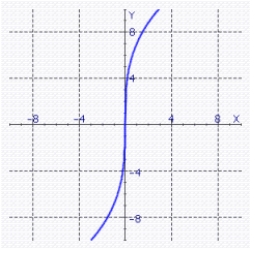
A)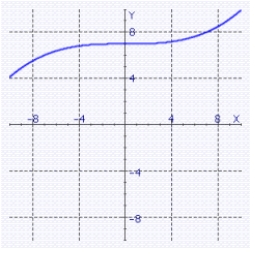
B)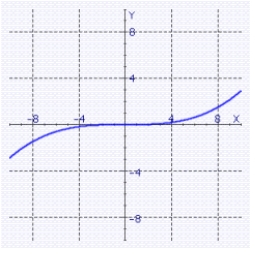
C)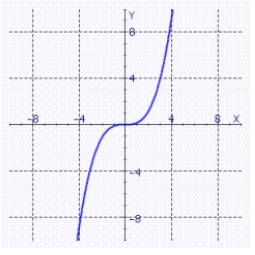
D)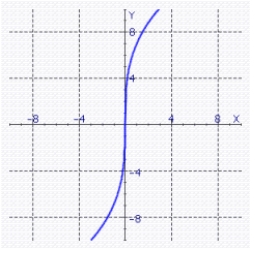


A)

B)

C)

D)


Unlock Deck
Unlock for access to all 144 flashcards in this deck.
Unlock Deck
k this deck
66
When the volume control on a stereo system is increased, the voltage across a loudspeaker changes from V 1 to V 2 , and the decibel increase is given by  Find the decibel increase if the voltage changes from 1.7 volts to 3 volts.
Find the decibel increase if the voltage changes from 1.7 volts to 3 volts.
A)db = 4.9
B)db = 8.7
C)db = 7.2
D)db = 11.4
E)db = 3.8
 Find the decibel increase if the voltage changes from 1.7 volts to 3 volts.
Find the decibel increase if the voltage changes from 1.7 volts to 3 volts.A)db = 4.9
B)db = 8.7
C)db = 7.2
D)db = 11.4
E)db = 3.8

Unlock Deck
Unlock for access to all 144 flashcards in this deck.
Unlock Deck
k this deck
67
Use common logarithms to solve for x in terms of y. 
A)
B)
C)
D)
E)

A)

B)

C)

D)

E)


Unlock Deck
Unlock for access to all 144 flashcards in this deck.
Unlock Deck
k this deck
68
Change to exponential form. 
A)
B)
C)
D)
E)

A)

B)

C)

D)

E)


Unlock Deck
Unlock for access to all 144 flashcards in this deck.
Unlock Deck
k this deck
69
One method of estimating the thickness of the ozone layer is to use the formula  , where I o is the intensity of a particular wavelength of light from the sun before it reaches the atmosphere, I is the intensity of the same wavelength after passing through a layer of ozone x centimeters thick, and k is the absorption constant of ozone for that wavelength. Suppose a wavelength of
, where I o is the intensity of a particular wavelength of light from the sun before it reaches the atmosphere, I is the intensity of the same wavelength after passing through a layer of ozone x centimeters thick, and k is the absorption constant of ozone for that wavelength. Suppose a wavelength of  cm with k = 0.36 ,
cm with k = 0.36 ,  is measured as 1.12. Approximate the thickness of the ozone layer to the nearest 0.01 centimeter.
is measured as 1.12. Approximate the thickness of the ozone layer to the nearest 0.01 centimeter.
A)x = 0.31 cm
B)x = 3.43 cm
C)x = 0.04 cm
D)x = 3.11 cm
E)x = 0.18 cm
 , where I o is the intensity of a particular wavelength of light from the sun before it reaches the atmosphere, I is the intensity of the same wavelength after passing through a layer of ozone x centimeters thick, and k is the absorption constant of ozone for that wavelength. Suppose a wavelength of
, where I o is the intensity of a particular wavelength of light from the sun before it reaches the atmosphere, I is the intensity of the same wavelength after passing through a layer of ozone x centimeters thick, and k is the absorption constant of ozone for that wavelength. Suppose a wavelength of  cm with k = 0.36 ,
cm with k = 0.36 ,  is measured as 1.12. Approximate the thickness of the ozone layer to the nearest 0.01 centimeter.
is measured as 1.12. Approximate the thickness of the ozone layer to the nearest 0.01 centimeter.A)x = 0.31 cm
B)x = 3.43 cm
C)x = 0.04 cm
D)x = 3.11 cm
E)x = 0.18 cm

Unlock Deck
Unlock for access to all 144 flashcards in this deck.
Unlock Deck
k this deck
70
Solve the equation. 
A)
B)
C)
D)
E)

A)

B)

C)

D)

E)


Unlock Deck
Unlock for access to all 144 flashcards in this deck.
Unlock Deck
k this deck
71
Some lending institutions calculate the monthly payment M on a loan of L dollars at an interest rate r (expressed as a decimal) by using the formula: ![<strong>Some lending institutions calculate the monthly payment M on a loan of L dollars at an interest rate r (expressed as a decimal) by using the formula: where k = [1 + ( r / 12 )]<sup> 12</sup><sup>t</sup><sup> </sup> and t is the number of years that the loan is in effect. An automobile dealer offers customers no-down-payment 7-year loans at an interest rate of 7%. If a customer can afford to pay $108 per month, find the price of the most expensive car that can be purchased.</strong> A)$ 7,145.44 B)$ 7,155.79 C)$ 7,161.43 D)$ 7,165.81 E)$ 7,164.60](https://d2lvgg3v3hfg70.cloudfront.net/TB8634/11eb7cb3_b020_9f4d_acd2_db5a73732f70_TB8634_11.jpg) where k = [1 + ( r / 12 )] 12t and t is the number of years that the loan is in effect. An automobile dealer offers customers no-down-payment 7-year loans at an interest rate of 7%. If a customer can afford to pay $108 per month, find the price of the most expensive car that can be purchased.
where k = [1 + ( r / 12 )] 12t and t is the number of years that the loan is in effect. An automobile dealer offers customers no-down-payment 7-year loans at an interest rate of 7%. If a customer can afford to pay $108 per month, find the price of the most expensive car that can be purchased.
A)$ 7,145.44
B)$ 7,155.79
C)$ 7,161.43
D)$ 7,165.81
E)$ 7,164.60
![<strong>Some lending institutions calculate the monthly payment M on a loan of L dollars at an interest rate r (expressed as a decimal) by using the formula: where k = [1 + ( r / 12 )]<sup> 12</sup><sup>t</sup><sup> </sup> and t is the number of years that the loan is in effect. An automobile dealer offers customers no-down-payment 7-year loans at an interest rate of 7%. If a customer can afford to pay $108 per month, find the price of the most expensive car that can be purchased.</strong> A)$ 7,145.44 B)$ 7,155.79 C)$ 7,161.43 D)$ 7,165.81 E)$ 7,164.60](https://d2lvgg3v3hfg70.cloudfront.net/TB8634/11eb7cb3_b020_9f4d_acd2_db5a73732f70_TB8634_11.jpg) where k = [1 + ( r / 12 )] 12t and t is the number of years that the loan is in effect. An automobile dealer offers customers no-down-payment 7-year loans at an interest rate of 7%. If a customer can afford to pay $108 per month, find the price of the most expensive car that can be purchased.
where k = [1 + ( r / 12 )] 12t and t is the number of years that the loan is in effect. An automobile dealer offers customers no-down-payment 7-year loans at an interest rate of 7%. If a customer can afford to pay $108 per month, find the price of the most expensive car that can be purchased.A)$ 7,145.44
B)$ 7,155.79
C)$ 7,161.43
D)$ 7,165.81
E)$ 7,164.60

Unlock Deck
Unlock for access to all 144 flashcards in this deck.
Unlock Deck
k this deck
72
Find the exact solution, using common logarithms, and an approximation of the solution of the equation to two decimal places. 
A)
B)
C)
D)
E)

A)

B)

C)

D)

E)


Unlock Deck
Unlock for access to all 144 flashcards in this deck.
Unlock Deck
k this deck
73
Find the inverse function of  .
. 
A)
B)
C)
D)
E)
 .
. 
A)

B)

C)

D)

E)


Unlock Deck
Unlock for access to all 144 flashcards in this deck.
Unlock Deck
k this deck
74
If the pollution of Lake Erie were stopped suddenly, it has been estimated that the level y of pollutants would decrease according to the formula y = y o e -0.3937t , where t is the time in years and y o is the pollutant level at which further pollution ceased. How many years would it take to clear 59% of the pollutants?
A)t = 0.58 years
B)t = 1.34 years
C)t = 2.02 years
D)t = 0.98 years
E)t = 2.26 years
A)t = 0.58 years
B)t = 1.34 years
C)t = 2.02 years
D)t = 0.98 years
E)t = 2.26 years

Unlock Deck
Unlock for access to all 144 flashcards in this deck.
Unlock Deck
k this deck
75
In fishery science, a cohort is the collection of fish that results from one annual reproduction. It is usually assumed that the number of fish N( t ) still alive after t years is given by an exponential function. For Pacific halibut,  , where N o is the initial size of the cohort. Approximate the percentage of the original number still alive after 7 years.
, where N o is the initial size of the cohort. Approximate the percentage of the original number still alive after 7 years.
A)24.7%
B)26.0%
C)8.2%
D)49.3%
E)14.0%
 , where N o is the initial size of the cohort. Approximate the percentage of the original number still alive after 7 years.
, where N o is the initial size of the cohort. Approximate the percentage of the original number still alive after 7 years.A)24.7%
B)26.0%
C)8.2%
D)49.3%
E)14.0%

Unlock Deck
Unlock for access to all 144 flashcards in this deck.
Unlock Deck
k this deck
76
The graph of a one-to-one function f is shown. Find the domain D and range R of the inverse function  .
. 
A)
B)
C)
D)
E)
 .
. 
A)

B)

C)

D)

E)


Unlock Deck
Unlock for access to all 144 flashcards in this deck.
Unlock Deck
k this deck
77
Use the theorem on inverse functions to determine whether f and g are inverse functions of each other. 
A)f and g are not inverse functions of each other.
B)f and g are inverse functions of each other.

A)f and g are not inverse functions of each other.
B)f and g are inverse functions of each other.

Unlock Deck
Unlock for access to all 144 flashcards in this deck.
Unlock Deck
k this deck
78
Find an exponential function of the form f (x) = ba x that has the given y-intercept and passes through the point P: y-intercept = 27; P (3,1);
A)
B)
C)
D)
E)
A)

B)

C)

D)

E)


Unlock Deck
Unlock for access to all 144 flashcards in this deck.
Unlock Deck
k this deck
79
An urban density model is a formula that relates the population density D ( in thousands/ mi 2 ) to the distance x (in miles) from the center of the city. The formula  for the central density a and coefficient of decay b has been found to be appropriate for many large U.S. cities. For the city of Atlanta in 1970, a = 5.5 and b = 0.10. At approximately what distance was the population density 800 per square mile?
for the central density a and coefficient of decay b has been found to be appropriate for many large U.S. cities. For the city of Atlanta in 1970, a = 5.5 and b = 0.10. At approximately what distance was the population density 800 per square mile?
A)39.8 mi
B)19.3 mi
C)21.6 mi
D)8.4 mi
E)49.8 mi
 for the central density a and coefficient of decay b has been found to be appropriate for many large U.S. cities. For the city of Atlanta in 1970, a = 5.5 and b = 0.10. At approximately what distance was the population density 800 per square mile?
for the central density a and coefficient of decay b has been found to be appropriate for many large U.S. cities. For the city of Atlanta in 1970, a = 5.5 and b = 0.10. At approximately what distance was the population density 800 per square mile?A)39.8 mi
B)19.3 mi
C)21.6 mi
D)8.4 mi
E)49.8 mi

Unlock Deck
Unlock for access to all 144 flashcards in this deck.
Unlock Deck
k this deck
80
The radioactive bismuth isotope 210 Bi has a half-life of 5 days. If there is 100 milligrams of 210 Bi present at t = 0, then the amount f(t) remaining after t days is given by:  How much 210 Bi remains after 5 days?
How much 210 Bi remains after 5 days?
A)52 milligrams
B)55 milligrams
C)50 milligrams
D)49 milligrams
E)59 milligrams
 How much 210 Bi remains after 5 days?
How much 210 Bi remains after 5 days?A)52 milligrams
B)55 milligrams
C)50 milligrams
D)49 milligrams
E)59 milligrams

Unlock Deck
Unlock for access to all 144 flashcards in this deck.
Unlock Deck
k this deck



